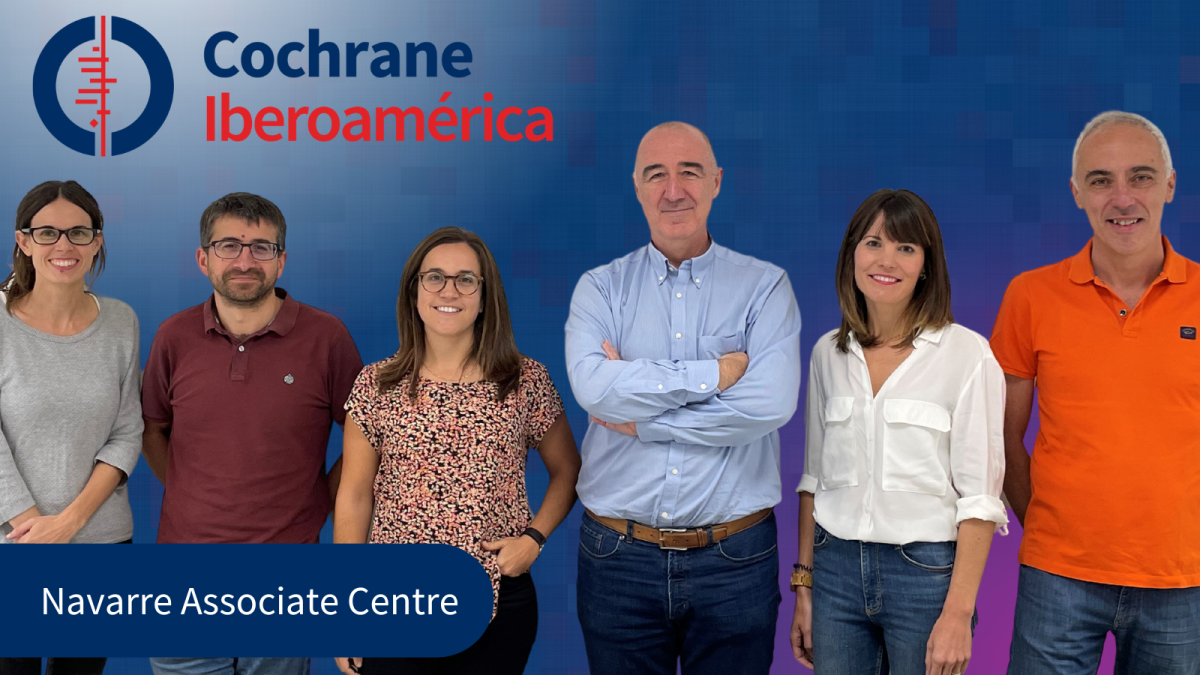
Cochrane's strength lies in its collaborative, global community. Cochrane Geographic Groups represent Cochrane in their host countries, advocate for the use of Cochrane evidence in health policy and practice, and support Cochrane's members and supporters who live there. Here, we spotlight the Navarre Associate Centre, a key player within Cochrane Iberoamérica, dedicated to enhancing evidence-based healthcare in Spain.
Established in 2015 through a formal agreement between the Health Department of the Government of Navarre and Cochrane Iberoamerica, the Navarre Associate Centre has been a cornerstone in advancing evidence-based practices in the region. The Centre also serves as the host for the Spanish satellite of Cochrane Hypertension, launched following an invitation from the group's base in Canada.
Juan Erviti, Director of the Navarre Associate Centre, highlights the Centre's commitment to rigorous research and knowledge translation: "Our work is deeply rooted in the belief that healthcare decisions should be guided by the best available evidence. By providing training on systematic reviews, GRADE, and critical appraisal, we empower healthcare professionals across Spain to make informed decisions that ultimately improve patient outcomes."
The Centre's contributions to the field are significant, offering systematic review training to health professionals, medical associations, university students, and Cochrane members. In addition, the Centre supports postgraduate research, including Master’s and doctoral theses. The Navarre Associate Centre has produced both Cochrane and non-Cochrane systematic reviews, with a particular focus on hypertension. Their recent publications include critical reviews on blood pressure targets in individuals with chronic renal disease and for people with hypertension and cardiovascular disease, the impact of pharmacotherapy on hypertension-induced left ventricular hypertrophy, and on alcohol intake reduction for controlling hypertension.
The Navarre Associate Centre is also a member of the newly formed thematic group, Cochrane Heart, Stroke, and Circulation, and the Spanish network for the Improvement of the Appropriateness of Clinical Practice (MAPAC). This engagement offers unique opportunities for knowledge translation both locally and nationally, contributing to a broader impact across Spain.
Luis Carlos Saiz, Managing Editor of the Spanish satellite of the Cochrane Hypertension Group, underscores the importance of collaboration in amplifying the Centre’s impact: "Our involvement in networks like MAPAC and the Spanish Medicines Agency’s BIFAP database allows us to work closely with clinicians and researchers, ensuring that our evidence synthesis work is directly applicable to clinical practice. These collaborations are crucial in driving improvements in healthcare delivery."
The Navarre Associate Centre plays a crucial role in shaping clinical practice within the Navarre Health Service. Clinicians propose relevant topics for the "Committee for the Improvement of the Appropriateness of Clinical Practice" (MAPAC) to address. The Centre's members, also part of the MAPAC committee, develop evidence synthesis reports based on both Cochrane and non-Cochrane systematic reviews. These reports form the basis of recommendations and guidelines, which are then transformed into legally binding resolutions by the Managing Director of the Navarre Health Service, ensuring effective implementation and positive impact on healthcare practices.

Looking forward, the Centre aims to align its activities more closely with the needs of clinicians and the goals of Cochrane. As part of the newly approved Cochrane Iberoamerica Evidence Synthesis Unit, the Centre is poised to contribute even more substantially to evidence synthesis in the region.
For those interested in getting involved, the Navarre Associate Centre welcomes collaboration and inquiries. "We are always looking to expand our network and invite healthcare professionals and researchers to join us in our mission to enhance evidence-based healthcare," adds Saiz.
- Visit the Cochrane Iberoamérica website
- Cochrane the Navarre Associate Centre via Juan Erviti (jervitil@navarra.es) or Luis Carlos Saiz (lsaizfer@navarra.es).
- Find a Cochrane Geographic Group in your country
